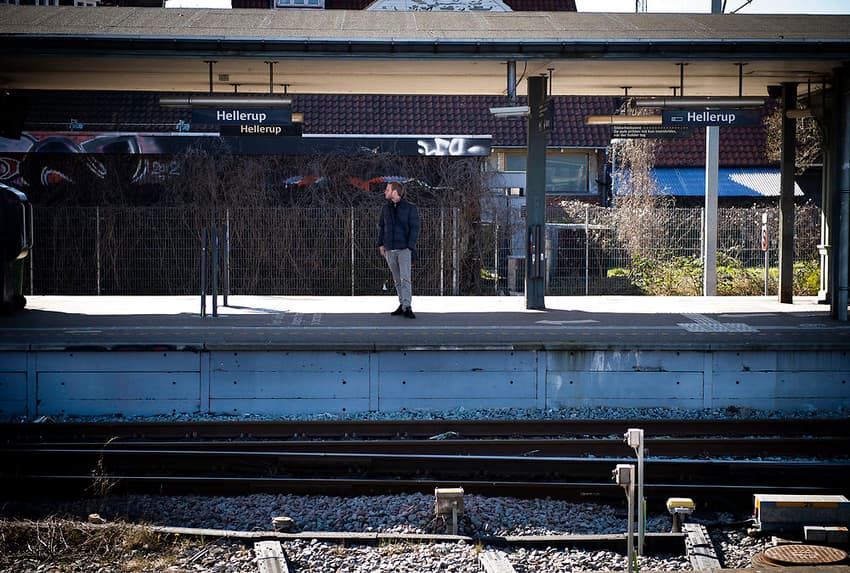Industrial conflict brings Denmark’s trains to a standstill

Rail traffic in the eastern part of Denmark was paralysed on Monday due to unofficial industrial action by train drivers with the national DSB rail company.
No trains east of the city of Odense operated from early Monday morning, DSB announced.
Regional and long-distance trains, as well as metropolitan S-trains in Copenhagen, were all encompassed by the wildcat strike, DSB head of information Tony Bispeskov said early on Monday.
“At six o’clock, we stopped train traffic east of Odense. So we are not operating east of Odense or in the whole of Zealand, neither S-trains nor regional or long-distance trains,” Bispeskov said.
Meanwhile, commuters between Malmö and Copenhagen were forced to take replacement buses to work on Monday morning.
Trains between Copenhagen Airport and Malmö's Hyllie station were stopped in both directions from 4am on Monday morning.
READ ALSO: Wildcat strike stops trains between Sweden and Denmark
The wildcat strike comes after an extended period of conflict between the train drivers and DSB, relating to freight and local trains operated by companies other than DSB.
“This is an unofficial strike action. As such, it is difficult to say when the train drivers will resume work,” Bispeskov said early on Monday.
“We encourage all passengers to keep themselves updated online. But it is advisable to find alternative forms of transport, such as bus or Metro trains,” he added.
Later on Monday, DSB announced that trains were beginning to run again and that normal service was expected on Tuesday.
Vi begynder så småt at køre tog igen
DSB´s kørende personale på S-banen og den østlige del af F&R tog er begyndt at melde sig klar til tjeneste.
Vi er netop startet op på Kystbanen.
DSB planlægger efter at køre fuld drift fra tirsdag morgen.
Mere info: https://t.co/5XmzHQRBkA pic.twitter.com/rmQdEz7LFi
— DSB (@omDSB) April 1, 2019
The relationship between DSB and its drivers has been strained since the end of 2017, when the national rail company left industrial agreements with the state and joined the Confederation of Danish Industry (Dansk Industri).
Following that, DSB has locally entered into agreements on employment conditions such as working hours. According to media avisen.dk, it is objections to these agreements that have resulted in Monday’s wildcat strikes.
DSB has demanded a significant reduction of union representatives. In November, Dansk Jernbaneforbund (The Association of Danish Rail Workers) agreed to reduce this number from 99 to 41.
But other conditions are yet to be agreed upon, and the association has so far failed to sign the agreement over the reduced representatives.
READ ALSO: Danish rail workers halt Copenhagen traffic over industrial dispute
Comments
See Also
No trains east of the city of Odense operated from early Monday morning, DSB announced.
Regional and long-distance trains, as well as metropolitan S-trains in Copenhagen, were all encompassed by the wildcat strike, DSB head of information Tony Bispeskov said early on Monday.
“At six o’clock, we stopped train traffic east of Odense. So we are not operating east of Odense or in the whole of Zealand, neither S-trains nor regional or long-distance trains,” Bispeskov said.
Meanwhile, commuters between Malmö and Copenhagen were forced to take replacement buses to work on Monday morning.
Trains between Copenhagen Airport and Malmö's Hyllie station were stopped in both directions from 4am on Monday morning.
READ ALSO: Wildcat strike stops trains between Sweden and Denmark
The wildcat strike comes after an extended period of conflict between the train drivers and DSB, relating to freight and local trains operated by companies other than DSB.
“This is an unofficial strike action. As such, it is difficult to say when the train drivers will resume work,” Bispeskov said early on Monday.
“We encourage all passengers to keep themselves updated online. But it is advisable to find alternative forms of transport, such as bus or Metro trains,” he added.
Later on Monday, DSB announced that trains were beginning to run again and that normal service was expected on Tuesday.
Vi begynder så småt at køre tog igen
— DSB (@omDSB) April 1, 2019
DSB´s kørende personale på S-banen og den østlige del af F&R tog er begyndt at melde sig klar til tjeneste.
Vi er netop startet op på Kystbanen.
DSB planlægger efter at køre fuld drift fra tirsdag morgen.
Mere info: https://t.co/5XmzHQRBkA pic.twitter.com/rmQdEz7LFi
The relationship between DSB and its drivers has been strained since the end of 2017, when the national rail company left industrial agreements with the state and joined the Confederation of Danish Industry (Dansk Industri).
Following that, DSB has locally entered into agreements on employment conditions such as working hours. According to media avisen.dk, it is objections to these agreements that have resulted in Monday’s wildcat strikes.
DSB has demanded a significant reduction of union representatives. In November, Dansk Jernbaneforbund (The Association of Danish Rail Workers) agreed to reduce this number from 99 to 41.
But other conditions are yet to be agreed upon, and the association has so far failed to sign the agreement over the reduced representatives.
READ ALSO: Danish rail workers halt Copenhagen traffic over industrial dispute
Join the conversation in our comments section below. Share your own views and experience and if you have a question or suggestion for our journalists then email us at [email protected].
Please keep comments civil, constructive and on topic – and make sure to read our terms of use before getting involved.
Please log in here to leave a comment.